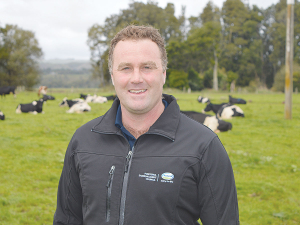Another Windfall for Fonterra Farmers, Unit Holders
Fonterra farmer shareholders and unit holders are in line for another payment in April.
 Fonterra Co-operative Council chair John Stevenson says Scope 3 emissions target is generating some apprehension among the shareholder base.
Fonterra Co-operative Council chair John Stevenson says Scope 3 emissions target is generating some apprehension among the shareholder base.
There is some unease among Fonterra's shareholder base as the co-operative sets out to tackle Scope 3 emissions generated by the business.
With Fonterra farmers already under the pump due to weather-related events, cost pressures, cash flow and labour shortages, how the Scope 3 emissions story will play out is currently unknown and causing uneasiness.
The co-operative has been meeting with farmers and will soon announce what the Scope 3 target will look like.
Scope 3 emissions include carbon emissions not produced by the company itself, but by those that it's indirectly responsible for, like farmers.
Fonterra says that 91% of its group emissions are from behind the farm gate.
Farmers are being told that the co-operative is under increasing pressure from both customers and consumers, regulators, and more and more from the financial sector, to put out a scope 3 emissions target.
Fonterra Co-operative Council chair John Stevenson told Dairy News that Scope 3 emissions “is generating some apprehension among the shareholder base”.
There is uncertainty around what steps farmers can take on farm to reduce their emissions intensity, and for some there may currently be a gap between “what farmers can deliver compared to what customers want”.
“As a council we are here to bring some balance to the conversation through representing the views of our farmers.”
Stevenson notes that the situation on farm is already challenging.
“Combine this with the pace of change required from regulators and changing customer demands, it is having an impact on how we farm.
“Regarding changing customer demands, our farmers are looking hard to Fonterra for evidence that changed practices on farm will deliver value into their pockets.”</p
Stevenson points out that Fonterra is well placed to help farmers overcome some of the sustainability challenges ahead.
“There is no doubt we will see further pressure from Government, customers and banks. The key will be to make sure Fonterra takes its farmers on the journey, provides support and does not set requirements that are too difficult to achieve.”
Fonterra farmers are telling the council that the pace of change within the last 18 months is causing pressure.
And Stevenson points out that the pressure is not just from a financial standpoint, it comes at a time when many farms have been understaffed due to workforce shortages.
“Our members are doing more on the farm and more off the farm,” he says.
Uncertainty also affects investment in the future.
Stevenson says there’s lot of technology out there to help with productivity, but farmers need certainty in the future to commit to these investments.
He says the forecast farm gate milk price is still under pressure.
“Farmers margins and balance sheets are as squeezed as they have been for a long time.
“There is uncertainty and volatility in the global market. Farmers will look to what they can control and consider their budgets carefully.”
Agrisea NZ has appointed Craig Hudson as it's new chief growth officer.
State farmer Landcorp, trading as Pamu, is a forecasting a full-year net profit of around $100 million.
Tony Aitken, chief executive of Ruralco, has been awarded the Excellence in Business Leadership Award at the ANZ Business of the Year Awards.
Global trade has been thrown into another bout of uncertainty following the overnight ruling by US Supreme Court, striking down President Donald Trump's decision to impose additional tariffs on trading partners.
Controls on the movement of fruit and vegetables in the Auckland suburb of Mt Roskill have been lifted.
Fonterra farmer shareholders and unit holders are in line for another payment in April.
OPINION: Staying with politics, with less than nine months to go before the general elections, there’s confusion in the Labour…
OPINION: Winston Peters' tirade against the free trade deal stitched with India may not be all political posturing by the…